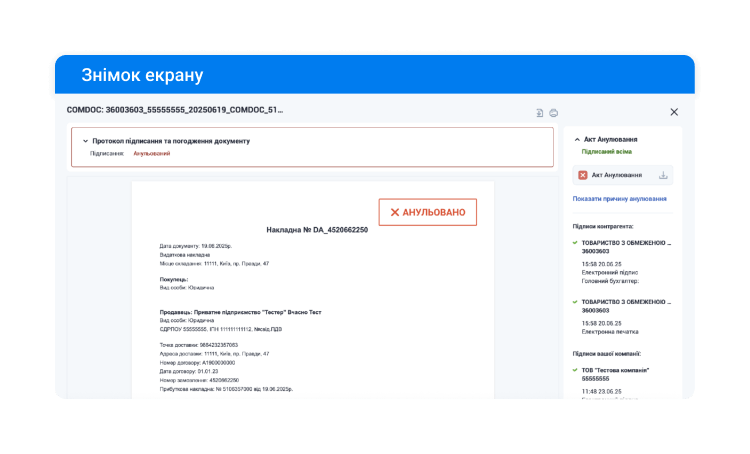Suppliers often face situations where, after signing documents, they need to adjust the volume of deliveries or the list of goods. Failure to do so properly can result in fines or even lawsuits.
To avoid legal risks when adjusting data in already signed EDI documents, the parties use cancellation certificates — special documents that cancel the validity of previous agreements. This article explains how it works.
Why retailers use cancellation in EDI exchange
In the process of electronic document management, retail chains exchange legally significant documents with suppliers, such as invoices, work completion certificates, invoices, etc. They record agreements between partners. The supplier and the network apply electronic signatures to them. This gives the documents legal force, and therefore they can become the subject of a tax audit or evidence in court.
In retail practice, it is not uncommon for chain employees to find inaccuracies in the invoice after it has been signed. Such inaccuracies may arise due to a shortage or absence of certain goods in the supplier’s warehouse. It takes a lot of time to check all the data in the document, so the network signs the invoice, and in case of disagreement, the parties agree on a different volume of delivery by phone. To record the new arrangements, they create a new invoice with the current data, and the previous document must be canceled.
If the parties do not cancel the previous document, two invoices with different data remain in the system. This duplication creates legal risks: it can lead to a lawsuit from the counterparty or a fine from the tax authorities.
When working with EDI services, data correction is also complicated because an EDI message that has already been created cannot be removed from the supply chain. If the parties do not cancel the previous document, two invoices with different data remain in the system. This duplication creates legal risks.To avoid them, EDI exchange uses document cancellation certificates.
What is a cancellation certificate
Cancellation certificate (COMDOC_019) is an EDI document that cancels a previously created legally significant document. When creating a revocation act, the EDI exchange participant must specify:
- the number and date of the legally significant document that the user wants to cancel;
- the reason for cancellation.
The cancellation certificate becomes effective when it is signed by both parties. If the counterparty rejects the cancellation certificate, the legally significant document remains in force and the initiator is obliged to fulfill the agreements set forth in it.
Technically, a cancellation certificate is an XML document. It can be created via the API, FTP, or in the EDI service’s web office. Unlike other EDI documents, it does not have a printed form. If it is signed by both parties, the legally significant document is marked «canceled». The same status is assigned to the document in the general list in the EDI service account. The cancellation certificate itself is not displayed in the list of documents, but it can be downloaded from the web cabinet if necessary.

Cancellation certificate in supply chains
Both the supplier and the retailer can create a revocation certificate. Usually, the party that created the document with incorrect data is the initiator of the revocation.
In retail practice, the most common document flow schemes are based on a sales or delivery note. The expense invoice is created by the supplier at the time of shipment and signed by the chain after reconciliation. The network creates a receipt invoice when it accepts the goods.
Since the supplier creates the expense invoice, it is in the supplier’s interest to cancel it in case of an error. If the invoice remains in force, the supplier is considered to be in breach of the agreement and is legally liable for it.
A retailer can also create a cancellation act for an expense invoice if it finds errors in the details (for example, an incorrect contract number). The chain does not want to wait for the supplier to re-create the invoice so as not to slow down the delivery of goods.
The retailer is interested in cancelling the sales invoices. The electronic signature on the invoice certifies that the chain has received the goods in full, even if this is not true. Therefore, if the sales invoice remains valid, the chain will suffer losses due to incomplete delivery.
Tax legislation obliges companies to register tax invoices for all primary documents within 30 days of their creation (cl. 89, subsect. 2, sect. XX of the Tax Code of Ukraine). Therefore, to comply with the law, only documents created within this period should be canceled.
How to create a cancellation certificate in the Vchasno.EDI service
In the Vchasno.EDI service, you can create cancellation certificates like any other EDI documents:
- in the user’s account system;
- in the service’s web office.
To create and cancel documents through the accounting system (BAS, 1C, SAP, etc.), Vchasno.EDI offers users the integration of the service via FTP or API. To work with EDI documents through the accounting system, you do not need to install additional programs.
Documents created in the Vchasno.EDI web office or sent to the service through integration with the accounting system are stored in Amazon S3 cloud data centers. The servers are located in the European Union and are reliably protected from any third-party interference. The storage period for documents is unlimited. If necessary, they can be downloaded to a computer or other external media.
Cancellation of legally significant documents is a critical process in the cooperation between suppliers and retailers. It allows you to quickly correct errors in EDI workflow, avoid duplication, fines, and lawsuits.
Use the Vchasno.EDI service to cancel outdated documents quickly, safely, and legally.






